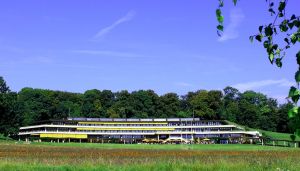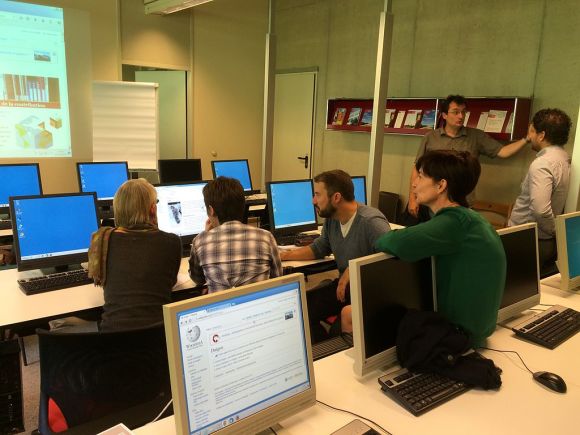
(“Bibliothèque cantonale et universitaire de Lausanne” by Odrade123, under CC-BY-SA-3.0)
Since April, the Cantonal and University Library of Lausanne (BCUL) hosts, on a monthly basis, Wikipedian get-togethers in their Unitheque room, referred as the “Wikipermanences”. How do they proceed and what happens during those gatherings? Basically, between noon and 2 pm, representatives of Wikimedia CH, the Swiss Wikimedia chapter, are available to all members of the general public to answer any questions they may have. You can show up whenever you wish and stay as long as you want. The entrance is open to all, there are no strings attached.
You might think you have nothing interesting enough to tell the world to become a Wikipedia editor – maybe you believe that you are not enough of an expert to contribute to articles ? Or, maybe you believe that editing is complicated and requires you to register and hold technical competencies?
Having believed all the above, the Wikipermanence organised in our venue enabled me take a step forward towards editing on Wikipedia. After all, why not me? Are those beliefs justified after all?

(“WMCH Volunteers teaching wikipedia during a wikipermanence “ by Chandres, under CC-BY-SA-3.0)
Myself, having never edited a Wikipedia page before, I began with a simple question – how to proceed? I was quickly introduced to editing pages by Frédéric, a member of Wikimedia CH, who is also working at the University of Lausanne (UNIL) and passionate about Wikipedia. I quickly realised that editing an already existing page is as easy as pie. Previously, the editing option required an understanding of the wikipedia language to code information, nowadays, there is a WYSIWYG[1] editor which enables you to modify pages intuitively.
To edit a page, there is no need to have an existing user profile, or any requirement of a previous knowledge of Wikipedia codes. All you have to do is to click on the link entitled “edit” (in French: “modifier”) next to each section’s title to open a very straightforward editing window. Before confirming any modifications, it is asked to detail in a couple of lines the type of corrections you contributed, so that one can follow up on them. Indeed, all the changes are stored with the IP address of the computer used to make those changes from, or with the username of the contributor if he has a Wikipedia profile.
How can we librarians add value to this area of knowledge ? Actually, on several levels, as we all know something – either from our professional activity, or from our personal interests – which enables us to contribute by adding or amending Wikipedia entries. Or if your favorite hobby is grammar and checking details, you could also participate by correcting any mistakes you come across. More specifically, we can be quite particular on providing adequate references in the bibliographies. At a beginner’s level, I was able to correct the “Publications” section of an article concerning a public figure, as the bibliography was not presented properly with incomplete sources. With our professional backgrounds, who better than librarians may check the quality of the bibliographies as well as complete them if required ?
Wikipedia’s WYSIWYG editor provides multiple areas to fill out and automatically compiles the information with the correct Wikipedia presentation model. There is no need to select a particular style, it is all done automatically.
If you have a professional or a personal area of expertise, then your contribution may be even more important in creating a page, instead of completing an existing page‘s content. In this case only, it’s better to create a profile and officially enter the community of Wikipedia editors.
So, what are you waiting for to participate in one of these Wikipermanences? It is an easy opportunity to discover the anonymous world of many editors and who knows, maybe getting started yourself!
Olivia Trono, Cantonal and University Library of Lausanne
- ↑ What You See Is What You Get

Can you help us translate this article?
In order for this article to reach as many people as possible we would like your help. Can you translate this article to get the message out?
Start translation